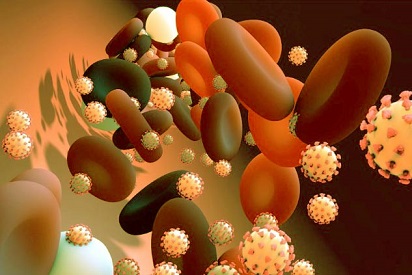Persistent changes in plasma proteome ten months after COVID-19 symptom onset in both vaccinated and unvaccinated individuals
Charles Tee Fact checked by:Thailand Medical News Team Sep 11, 2024 7 months, 2 weeks, 21 hours, 39 minutes ago
Medical News: A recent study conducted by researchers from the U.S. National Institutes of Health (NIH), including multiple institutions such as the National Heart, Lung, and Blood Institute (NHLBI) and the National Institute of Allergy and Infectious Diseases (NIAID), sheds light on the long-term effects of COVID-19 on the human plasma proteome. This research provides crucial insights into how the body continues to respond to the virus even months after initial recovery, with notable differences between vaccinated and unvaccinated individuals. This
Medical News report explores the key findings of this important study and what it means for understanding the post-acute sequelae of COVID-19.
 Persistent changes in plasma proteome ten months after COVID-19 symptom
Persistent changes in plasma proteome ten months after COVID-19 symptom
onset in both vaccinated and unvaccinated individuals
The Study’s Background and Methodology
The study aimed to evaluate the changes in plasma proteome - the full set of proteins present in blood plasma - in individuals who had recovered from mild to moderate cases of COVID-19. Researchers enrolled 90 participants from a natural history study, 66 unvaccinated and 24 vaccinated, who had tested positive for SARS-CoV-2 using PCR. They analyzed these individuals’ plasma samples within 40 days of symptom onset, as well as at three months and ten months post-infection.
The researchers conducted the analysis using an advanced aptamer-based assay called SOMAScan, which measures over 7,200 proteins. The data was collected at two different time points: during the acute phase and at three and ten months post-infection. This article will now delve into the results of this thorough investigation, offering a glimpse into how both vaccinated and unvaccinated individuals’ bodies responded to the virus.
Acute Phase: A Tale of Two Responses
At the initial stage of infection, significant differences were observed between vaccinated and unvaccinated individuals. Unvaccinated patients showed an overexpression of proteins involved in the body’s inflammatory and immune responses, with key pathways such as cytokine signaling and matrisome-related processes activated. These individuals had elevated levels of proteins like C3, IL-17RE, and TREM1, which are critical to initiating and maintaining inflammation.
On the other hand, vaccinated individuals exhibited a milder immune response, with an emphasis on adaptive immunity rather than inflammation. Their bodies were better equipped to mount a protective response through the production of antibodies and other immune cells without triggering a large-scale inflammatory reaction. This adaptive immune response included pathways associated with the negative regulation of immune responses, cellular stress, and humoral immunity.
Long-Term Effects: Three and Ten Months Post-Infection
While the acute phase highlighted immediate immune responses, the persistence of these proteomic changes over time became a focal point of the study. At t
hree months, unvaccinated individuals continued to display elevated inflammatory markers, although at diminished levels compared to the acute phase. Pathways such as neutrophil degranulation and immune regulation remained active, signifying that the immune system was still on high alert even months after the infection had subsided.
By the ten-month mark, researchers found that both vaccinated and unvaccinated individuals continued to experience changes in their plasma proteomes. However, the nature and extent of these changes varied significantly between the two groups.
In unvaccinated individuals, the overexpression of proteins involved in inflammatory responses, such as CCL15, TREM1, and DEFA5, persisted. These proteins are linked to chronic inflammation, which could contribute to prolonged symptoms in unvaccinated individuals, often referred to as "long COVID."
Meanwhile, the vaccinated individuals also showed signs of chronic inflammation at ten months and certain proteins related to cellular stress and metabolic processes remained elevated. However, the adaptive immune system in vaccinated individuals appeared to return to a more normal state. Both groups, however, showed underexpression of proteins critical for normal cellular functions, such as signaling and homeostasis pathways, highlighting the potential long-term impact of COVID-19 on essential biological processes.
Implications for Post-Acute Sequelae and Long COVID
The study’s findings are particularly relevant for understanding the phenomenon of post-acute sequelae of SARS-CoV-2 (PASC), commonly known as long COVID. The persistent inflammation and immune activation in unvaccinated individuals, as indicated by proteins like C3b and IL-17RE, suggest that the body’s response to COVID-19 may remain dysregulated for months after the initial infection.
In vaccinated individuals, some proteins still remained altered. This raises important questions about the efficacy of the role of vaccination in preventing or minimizing long COVID symptoms.
One of the key findings of this article is the persistence of abnormal proteomic patterns in both vaccinated and unvaccinated individuals, albeit to different extents. Researchers found that both groups continued to show under expression of proteins involved in crucial biological pathways such as VEGF-VEGFR2 signaling, which plays a role in angiogenesis and vascular health. This persistent dysregulation could have implications for long-term recovery and the risk of developing chronic conditions related to immune and vascular health.
Conclusion
In conclusion, this study highlights the long-term effects of COVID-19 on the plasma proteome, revealing persistent changes in both vaccinated and unvaccinated individuals up to ten months after symptom onset. While vaccination reduces the severity and extent of these changes, both groups showed signs of ongoing immune activation and dysregulation.
The study findings emphasize the importance of continued research into the long-term effects of COVID-19, particularly in the context of post-acute sequelae and long COVID.
The study findings were published in the peer-reviewed journal Frontiers in Immunology.
https://www.frontiersin.org/journals/immunology/articles/10.3389/fimmu.2024.1448780/full
For the latest COVID-19 News, keep on logging to Thailand
Medical News.
Read Also:
https://www.thailandmedical.news/news/new-study-reveals-how-covid-19-variants-differently-impact-heart-cells
https://www.thailandmedical.news/news/breaking-even-mild-covid-19-can-cause-microvasculature-changes-of-the-optic-nerve
